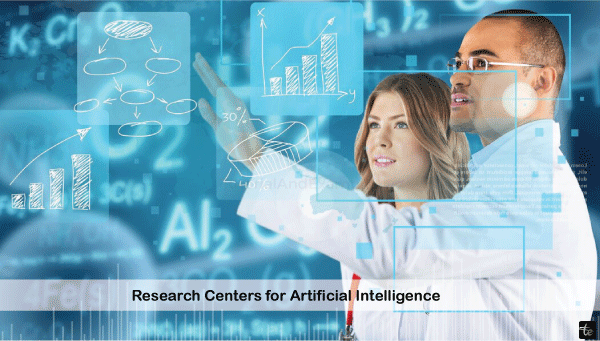Research Center for Artificial Intelligence
Introduction:

A research center for artificial intelligence is a location where brilliant minds collaborate to study and develop computer programs that can think and learn like humans. These programs are used to solve challenging issues, enhance technology, and improve how computers comprehend and interact with humanity. It's like a secret laboratory where scientists and specialists come up with incredible ideas and construct remarkable things utilizing artificial intelligence.
Some of the prominent AI research centers include:
- OpenAI
- DeepMind
- Google AI
- Microsoft Research AI
- Facebook AI Research (FAIR)
- IBM Watson Research Center
- MIT Computer Science and Artificial Intelligence Laboratory (CSAIL)
- Stanford AI Lab
- Carnegie Mellon University (CMU) AI Research
- AI Research Labs in China
It's important to note that the AI research landscape is continuously evolving, and new research centers and initiatives may have emerged since my last update. Additionally, some research centers may have changed their names or shifted their focus. Therefore, it's recommended to conduct a current search to find the most up-to-date information on AI research centers worldwide.
Benefits of providing research center for artificial intelligence:
1.Healthcare: Artificial intelligence may help with medical diagnostics, medication development, patient monitoring, and personalized treatment.
2. Finance: AI is used for fraud detection, algorithmic trading, risk assessment, and customer service in the banking and finance industry.
3. Retail and E-commerce: AI powers recommendation systems, chatbots, and virtual shopping assistants to enhance the customer experience and improve sales.
4. Manufacturing and Robotics: AI enables automation, quality control, predictive maintenance, and collaborative robots (cobots) in the manufacturing industry.
5.Transportation: In the transportation industry, AI is critical for self-driving automobiles, traffic control systems, route optimization, and predictive maintenance.
6. Natural Language Processing (NLP): AI is utilized in NLP, sentiment analysis, chatbots, virtual assistants, and voice recognition systems.
7. Gaming: AI plays a role in creating intelligent opponents, character behaviors, and game environment simulations.
8. Cybersecurity: AI helps in detecting and preventing cyber threats, identifying patterns of malicious activities, and enhancing network security.
9. Agriculture: AI can optimize crop yield, monitor soil conditions, predict weather patterns, and automate farming processes.
10. Energy and Utilities: AI is applied for energy demand forecasting, smart grid optimization, predictive maintenance of infrastructure, and renewable energy management.
Advantages of doing research work in the field of Artificial Intelligence:
1. Automation
2. Efficiency and Productivity
3. Decision Making
4. Improved Accuracy
5. Enhanced Customer Experience
6. Advanced Problem Solving
7. Continuous Learning and Adaptation
8. Assistance in Research and Exploration
9. Risk Mitigation
10. Accessibility and Inclusivity
11. Healthcare Advancements
12. Improved Efficiency in Industries
Disadvantages of doing research work in the field of Artificial Intelligence:
1. Job Displacement: AI automation can potentially lead to job loss and displacement of human workers in certain industries.
2. Lack of Human Judgment: AI lacks the ability to exhibit human-like judgment, intuition, and emotional understanding, which can limit its decision-making capabilities in certain contexts.
3. Ethical Considerations: AI systems might arrive at, especially when they are educated on biased data or lack sufficient ethical norms.
4. Privacy and Security Concerns: The application of AI necessitates collecting and analyzing massive volumes of personal data, which represents privacy and security problems.
5. Dependence on Technology: Overreliance on AI systems can make society vulnerable to technological failures, disruptions, or malicious attacks.
6. Cost and Infrastructure: Developing and deploying AI technologies can be expensive, necessitating large expenditures in infrastructure, research, and development.
7. Limited Creativity and Innovation: AI may fail to duplicate human creativity, intuition, and the capacity to think beyond the box, which may limit its use in some disciplines.
8. Social Implications: AI advancements raise important social and ethical questions about the impact on employment, inequality, and the potential loss of human skills and interactions.
9. Lack of Accountability: Determining responsibility and accountability for decisions made by AI systems can be challenging, especially in cases of errors or accidents.
10. Dependency on Data Availability: AI algorithms heavily rely on high-quality and diverse data for training and learning, and limitations in data availability or quality can affect their performance and reliability.
It's important to note that these disadvantages are not universal and can be mitigated through proper regulation, ethical considerations, and responsible implementation of AI technologies.
Conclusion:
A research center for artificial intelligence drives innovation and technological advancements. It solves complex problems, automates tasks, and enhances user experiences. Ethical considerations and responsible development are essential in maximizing the AI's benefits while addressing challenges. Collaboration and knowledge sharing accelerate progress, ensuring a positive impact on society.